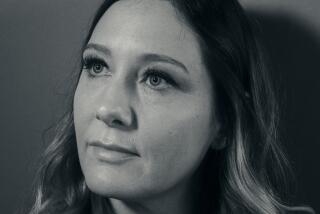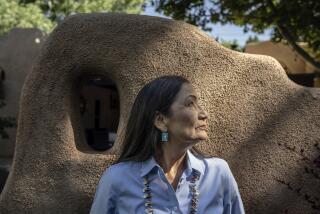Baby’s Future Hinges on Court’s View of Motherhood
- Share via
Jodi Argleben, 19 years old this month, was born to an Aleut Indian woman and a Russian man in the tribal village of Akhiok, on Alaska’s Kodiak Island.
This heritage is very important to many people--strangers to Jodi Argleben--in the United States and Canada and maybe even in other places too.
These people say that Jodi’s baby, 7-month-old Rebecca, who is one-quarter Aleut, belongs with the tribe. The Indians have bestowed tribal membership on her in absentia.
Jodi Argleben finds this shocking, terrifying and wrong. She says that her blood has no hold on her, that her life as the adopted daughter of a non-Indian family is the only one she has really known and that it fits her well.
Now Jodi wants her daughter, born of an unmarried union with her high school sweetheart, to remain with the Canadian couple who hope to adopt her. She says she wants Rebecca to have a chance.
“I feel right here,” Jodi told me as we sat in the living room of her parents’ home in Cypress the other day. “I felt out of place when I went there. And my baby is not going there either.”
There , of course, is Akhiok, about 5,000 miles away, and until Jodi and her sister Janice traveled there with the baby last summer, it was just a harsh, forgotten memory in a toddler’s mind.
Jodi and Janice, also adopted by the Arglebens, were taken from their parents after allegations of abuse. Jodi was 18 months old and her sister three years older than that.
“I remember we landed on this gravel runway,” Jodi said of last summer’s trip. “And I was thinking all we needed to do was hit a rock and we would flip over. Then we went to some clinic. We had sandwiches and chips. We met the couple who want to adopt Rebecca and the chief and his wife.
“They were nice and all, but they didn’t seem too excited to see the baby. By this time, I had made up my mind. I wanted to leave and I didn’t want my baby there. The houses were old, with no carpet and no heaters. The bathrooms stunk. . . . We didn’t stay more than three hours.”
As Jodi and I talked--about her predicament, the legal attempts to resolve it, and her steely determination to spare her child what she feels would be a life of dead-ends--incredulity, mixed with sarcasm, crept into her young voice.
“None of this makes sense,” she said. “If they wanted children so bad, why didn’t they fight to keep me and my sister there? Here, years later, they want to take my baby.”
When I mentioned the Indian Child Welfare Act, the 1978 law that aims to preserve American Indian culture by granting tribal jurisdiction over adoptions of Indian children, Jodi told me that she just didn’t get it.
What she understands is that strangers, misguided or hypocritical, want to control what is rightfully hers to decide. Rather than allow these people to guide Rebecca’s future, Jodi says she will reclaim her daughter and raise her on her own.
Unlike Jodi, I can understand the rationale behind the Aleuts’ decision to fight for custody of Rebecca Argleben. In the past, and undoubtably in the present, Indian children have been uprooted from their people and their culture. And any society will eventually wither without its young.
But on another level, practical and prosaic, I have mentally put myself in this young mother’s place.
My own daughter was born in Mexico City, where my husband and I were residents. That makes her, according to the laws of that country and our own, a citizen of both nations.
But what if my husband and I had decided that we did not want to raise our child? Would it be up to the government of Mexico to tell us who could?
Jodi Argleben’s Aleut heritage may show through her eyes, in the warm glow of her skin, but her assimilation into American culture is complete.
Rational people would be appalled, I believe, if another nation were to intervene in the adoption of a different American child, one without Indian blood. So, too, should they be concerned here.
Like so many other young women, Jodi was jolted and confused by an unplanned pregnancy. She considered an abortion, she says, but by then it was too late. She dropped out of high school and on her 18th birthday, her boyfriend proposed.
But she turned him down, Jodi says, because she knew it wouldn’t work. They broke up a few months after that.
Jodi says that when Rebecca was born, her boyfriend seemed hardly to care. But now, months later, he too has hired an attorney in an attempt to play a role in Rebecca’s life.
Ultimately the courts, in Vancouver or in Orange County or perhaps in both places, will issue a final edict on Rebecca Argleben’s future.
If the tribe wins, it will no doubt be because of the Indian Child Welfare Act. If Jodi wins, it may be because someone believed that the Aleuts’ right to preserve their culture cannot supersede a mother’s right to protect her child.
More to Read
Sign up for Essential California
The most important California stories and recommendations in your inbox every morning.
You may occasionally receive promotional content from the Los Angeles Times.













